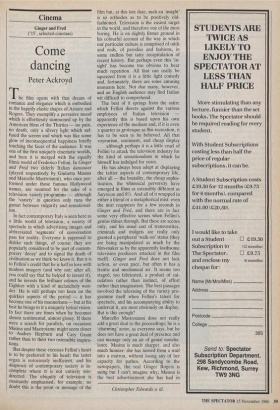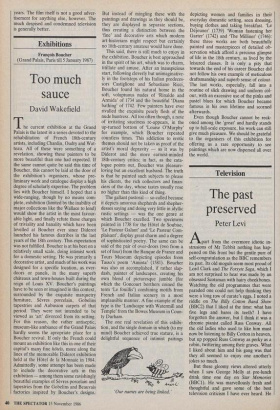Cinema
Ginger and Fred ('15', selected cinemas)
Come dancing
Peter Ackroyd
The film opens with that dream of romance and elegance which is embodied in the happily elastic shapes of Astaire and Rogers. They exemplify a pervasive mood which is effortlessly summoned up by the American films of the Thirties — no pain, no death, only a silvery light which suf- fused the screen and which was like some glow of inconsequential happiness briefly touching the faces of the audience. It was one of the first uniquely cinematic worlds, and here it is merged with the equally filmic world of Frederico Fellini. In Ginger and Fred two elderly Italian danseuses (played respectively by Giulietta Masina and Marcello Mastroianni), who once per- formed under those famous Hollywood names, are reunited for the sake of a television variety programme — although the 'variety' in question only runs the gamut between vulgarity and sensational- ism.
In fact contemporary Italy is seen here as a little world of televiSion, a society of spectacle in which advertising images and abbreviated `segments' of conversation pass for reality. Everyone is supposed to dislike such things, of course: they are popularly considered to be part of contem- porary 'decay' and to signal the death of civilisation as we think we know it. But it is to Fellini's credit that he is half in love with modern imagery (and why not: after all, you could say that he helped to invent it), and he invests the brilliant colours of the Eighties with a kind of melancholy won- der. He is still perhaps too keen on the quirkier aspects of the period — it has become one of his mannerisms — but at his best he brings to it a uniquely lyrical vision. In fact there are times when he becomes almost sentimental, almost glossy. If there were a search for parallels, on occasions Masina and Mastroianni might seem closer to Audrey Hepburn and Cary Grant rather than to their two ostensible inspira- tions.
But despite these excesses Fellini's heart is to be preferred to his head; the latter organ is notoriously inefficient, and his diagnosis of contemporary society is in- complete where it is not entirely mis- directed. The ubiquity of television is constantly emphasised, for example; no doubt this is the point or message of the film but, at this late date, such an 'insight' is so orthodox as to be positively old- fashioned. Television is the easiest target in the world, and therefore one of the most boring. He is on slightly firmer ground in his colourful account of the way in which our particular culture is comprised of odds and ends, of parodies and fashions, in some endless but tatty recapitulation of recent history. But perhaps even this 'in- sight' has become too obvious to bear much repetition. All that can really be squeezed from it is a little light comedy and, fortunately, there are some amusing moments here. Not that many, however, and an English audience may find Italian wit difficult to comprehend.
The best of it springs from the satire which Fellini directs against the various employees of Italian television apparently this is based upon his own experience of the medium and, if it is even a quarter as grotesque as this recreation, it has to be seen to be believed. All that voyeurism, sentiment, and cheap display . . . although perhaps it is a little cruel of Fellini to attack the television industry for the kind of sensationalism in which he himself has indulged for years.
He has always been adept at displaying the tattier aspects of contemporary life, after all — the brutality, the cheap sophis- tication, the whimsical perversity have emerged in films as ostensibly different as Satyricon and 81/2. And .all of it wrapped in either a literal or a metaphorical mist: even the mist reappears for a few seconds in Ginger and Fred, and there are in fact some very effective scenes when Fellini's genius shines through. But these are scenes only, and his usual cast of transvestites, criminals and midgets are really only granted a peripheral `walk-on' status (they are being manipulated as much by the film-maker as by the apparently loathsome television producers attacked in the film itself). Ginger and Fred does not lack action, or even pace, but often it has a frantic and mechanical air. It seems too staged, too fabricated, a product of cal- culation rather than instinct, of effort rather than imagination. The best passages involved the televising of the variety pro- gramme itself when Fellini's talent for spectacle, and his accompanying ability to undercut it, are most obviously on display. But is this enough?
Marcello Mastroianni does not really add a great deal to the proceedings; he is a `charming' actor, as everyone says, but he does not have a great deal of presence and can manage only an air of genial noncha- lance. Masina is much sharper, and also much funnier: she has turned from a waif into a matron, without losing any of her capacity for pathos. According to the newspapers, the real Ginger Rogers is suing but I can't imagine why; Masina is the best advertisement she has had in years. The film itself is not a good adver- tisement for anything else, however. The much despised and condemned television is generally better.



































































 Previous page
Previous page